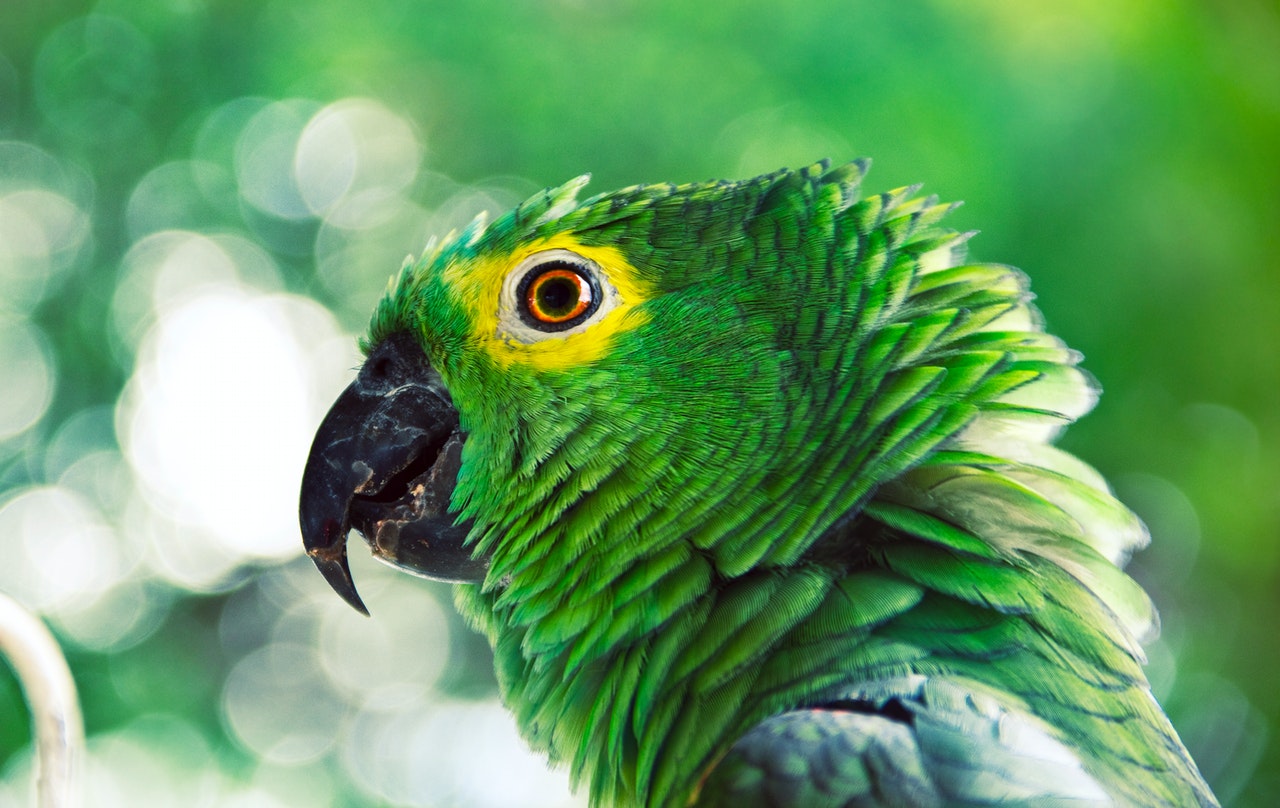With their fierce intelligence and innate desire to be around people, parrots make fantastic pets. They form deep, lasting bonds with their owners, and they’ve been known to enjoy cuddles once they’ve bonded. Still, like all animals, parrots can sometimes be a bit naughty. If you’ve ever been on the receiving end of a nip from your parrot’s sharp beak, you’ve probably wondered, “How do you stop a bird from biting?” We’ve got several tips that will help nip parrot biting in the bud, so you can live a peaceful, happy, bite-free life with your feathered friend.

Why do parrots bite?
Like most pets, parrots are extremely affectionate with their owners. That makes it all the more confusing when your parrot bites. Here are some of the reasons why it might be happening.
They’re feeling anxious
It’s a common misconception that bonded parrots won’t bite. If provoked, any creature will take self-defense quite seriously. In the case of parrots, their first line of defense is often biting. Anxiety is one reason your parrot may be a little nippy. If there’s been a great deal of stress in your household, whether it’s verbalized or not, your bird will sense your anxiety and mirror it. Try not to have arguments or blast music when you’re around your parrot, as raised voices cause an undeniable spike in anxiety. Birds have a hearing range similar to ours, so if it’s too loud for you, it’s also too loud for your parrot.
They think they’re being locked up
If you handle your parrot only when it’s time for him to go back in his cage, he’ll quickly come to associate your hands with confinement. An easy way to overcome biting issues in this case is making sure you spend plenty of time stroking your bird, giving him treats, and playing with him as well as picking him up to put him in his cage. Your bird will be more relaxed around you, and you’ll be a lot less likely to sustain nibble-induced damage.
They think they’re in trouble
Have you ever shooed your bird away for being naughty? If yes, your parrot could be in the mood to bite because he thinks he’s already in trouble. Even if your parrot is being particularly obnoxious, shouting, shaking the cage, or shooing him away is a recipe for disaster. According to the Hagen Avicultural Research Institute, these behaviors teach your bird only that acting out will get him attention. Parrots are intelligent, and they can hold grudges. The best way to discipline them is to firmly say, “No,” and then ignore their behavior. Instead of punishing them when they misbehave, use positive reinforcement to encourage good behavior.

What to do if your parrot bites you
Being bitten stings like the dickens, but we don’t recommend shouting, swearing, or otherwise overreacting to a bird bite. Try one of these four simple options instead.
- Gently blow in your bird’s face to get his attention. Hopefully, this will distract your parrot enough for him to stop biting you. Some people recommend using a spray bottle, but this can backfire by making your parrot fear grooming. Blowing in his face won’t hurt him, but it will definitely startle him.
- If your parrot is perched on your shoulder, try placing him on the floor. Birds are more comfortable higher up, so being placed on the floor makes them feel more vulnerable than aggressive. The point isn’t to frighten your parrot, but you do want them to realize they’ve done something naughty.
- If you’re holding your bird on your hand or wrist, you can also try lowering your arm a few inches to get his attention without raising your voice.
- If you’ve trained your bird, now is a good time to instruct him to step onto his favorite perch. Let him cool off in his cage before interacting with him again. But we don’t advise waiting too long; around 20 minutes will do.
Give your parrot space instead of hovering over him. Not only does this put some distance between you and your peeved parrot, but hopefully, it will distract him from the cause of his aggravation. When your parrot settles down and becomes affectionate again, make sure to praise him and give him a treat for engaging in nonaggressive behavior.

Preventing bites before they happen
Parrots have distinct personalities, so you’ll see the signs before your bird bites. Some birds make odd, growling sounds, while others fan their tails and puff up their feathers to make themselves appear larger and more threatening. If you see your bird beginning to show signs of aggression, speak to him calmly until he starts to relax. However, that doesn’t always work, in which case, it’s best to put some space between you and your bird until he calms down. Just like us, birds can lash out when they’re stressed, so try not to take it personally.
Trust is essential to building a healthy, affectionate relationship with your bird. Please ensure you spend plenty of time bonding with your parrot. Speak to him frequently in an upbeat, affectionate tone. Reinforce positive behaviors and take time to train your bird. Not only is watching your parrot do tricks adorable, but it also helps establish trust and prevents your bird from becoming bored and lonely. With time and effort, you’ll be able to enjoy a beautiful, bite-free relationship with your feathered friend.



